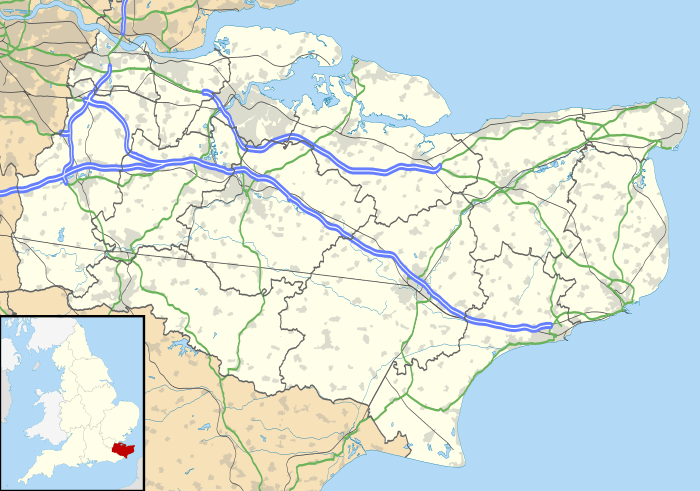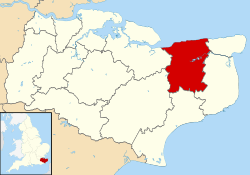Patrixbourne
Coordinates: 51°15′18″N 1°08′10″E / 51.255°N 1.136°E
Patrixbourne is a rural English village south-east of Canterbury in Kent, mostly taken up by agricultural hills. Along with almost contiguous Bekesbourne to the north it makes up the civil parish of Bekesbourne-with-Patrixbourne in the City of Canterbury district.
Geography
The village is about 3 miles from the city centre along the A2 road to Dover, on a ford over the River Nailbourne.
History
In the Domesday Book Patrixbourne was held by Bishop Odo, but in 1200 it was transferred to a cell of an abbey in Normandy and thereafter to Merton Priory. After the Reformation it passed to the Says and then the Cheyneys.
An Anglo-Saxon cemetery is on the Bifrons estate or Bifron's Park in the south of the village. Bifrons took its name from a name for the Roman god Janus ("the two-faced") as well as having two wings and was built in the early 1600s by John Bargrave (Bargar) the Elder, brother of Isaac Bargrave Dean of Canterbury. The Bargrave family were staunchly Royalist during the Civil War and Bargrave's son John sold the estate in 1661 as he resumed his ecclesiastical career after the Restoration. In September 1694 the estate was bought by Sandwich MP John Taylor. It was remodelled by Edward Taylor in 1770 and in 1820 became the seat of Elizabeth Conyngham, Marchioness Conyngham, last mistress of George IV. The house was demolished in the late 1940s.
The parish church is dedicated to St Mary.
Amenities
Higham Park is a large neoclassical mansion, once the home of eccentric racing driver Count Louis Zborowski. His giant-engined "Chitty Bang Bang" cars were built there, as was Babs, the vehicle used in J.G. Parry-Thomas's attempt for the land speed record at Pendine Sands in 1927. It is in the far south of the parish, so its nearest amenities are either those of Patrixbourne or of Bridge.
External links

| Wikimedia Commons has media related to Patrixbourne. |


